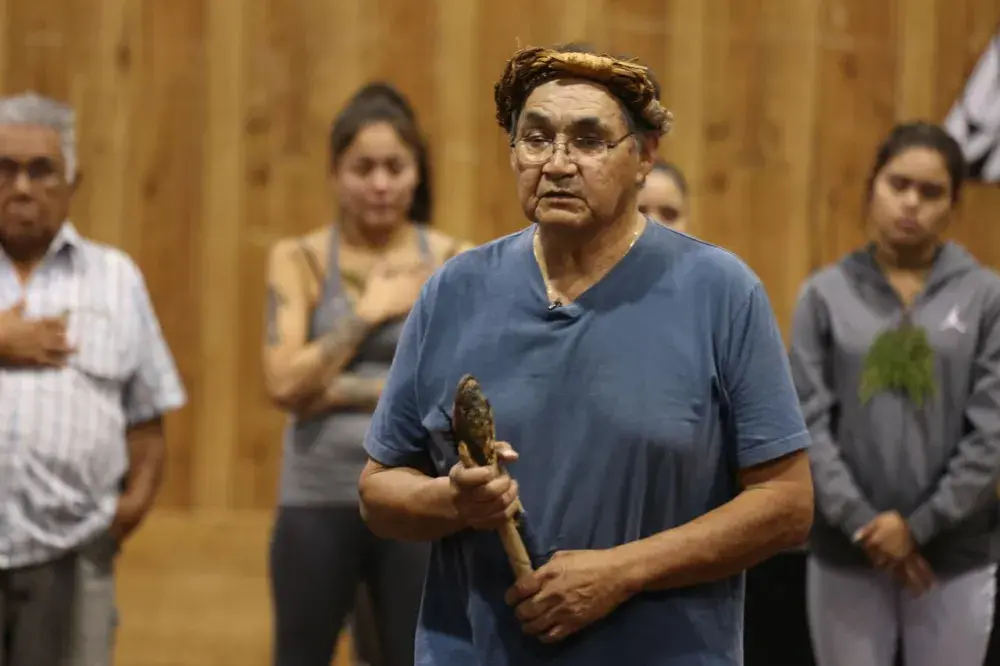Planning is still in the works but there has been a soft launch of a model of health care services that will make its rounds to the central region communities of Ahousaht, Hot Springs Cove, Opitsaht, Ty-Histanis, Esowista, Hitatcu and Macoah.
It’s called ʔuukʷinkpanač and it means ‘walking in togetherness’. Who is walking in togetherness? It’s two separate societies representing modern western medicine and ancient Nuu-chah-nulth healers. Launched by the Vancouver Island West Coast Primary Care Initiative Health Care Society, ʔuukʷinkpanač promises to deliver primary health care services that include traditional healing and wellness options for the First Nations peoples of the Clayoquot Sound region.
The Vancouver Island West Coast PCI Health Society launched its new logo, website and traditional name in December 2024. According to their news release dated Dec. 16, 2024, ʔuukʷinkpanač, funded by the B.C. Ministry of Health and the First Nations Health Authority (FNHA), is a non-profit organization made up of health care providers including physicians, registered nurses, mental health assistance and traditional wellness supports.
The new society’s mandate is to collaborate with all the service providers available to meet the needs of the people, “including all First Nation, Métis and Inuit peoples residing in (or who are able to access) the First Nations communities.”
According to the First Nations Health Authority, The FNPCI (First Nations Primary Care Initiative) is nation-driven and community-led.
“In order to meet the health and wellness needs of First Nations people, it is important that primary care is culturally safe and trauma-informed, and where Indigenous ways of knowing and being are woven into health care services,” stated the FNHA.
Suzanne Williams is the director of operation for the new initiative, and she is working with health care professionals and Uu Ustukyuu, a society that offers cultural wellness services. The plan is to build teams through the two groups to serve the health care needs of the central region Nuu-chah-nulth nations in their communities, in an effort to fill existing gaps that exist there.
The West Coast Primary Care Initiative will see different types of traditional and Western care providers working together in a team-based approach in the same space to meet the health care needs of First Nations peoples.
“Elders, sacred knowledge keepers and traditional wellness practitioners will be key members of the primary health care team and work in close collaboration with Western medicine practitioners,” states the FNHA website.
The West Coast PCI has been named ʔuukʷinkpanač and is now serving Hitatcu and the nearby Tla-o-qui-aht communities. They are planning to expand so that two complete health care teams can alternate and make regularly scheduled trips to clinics in the communities. But first they need to grow their teams.
Each community has a clinic where doctors and nurses come to deliver health care services. ʔuukʷinkpanač health care workers will be there to provide support, to help the people access both models of health care.
Elder Dave Frank offers cultural wellness services through Uu Ustukyuu Society.
“We recognize that we need Western healing ways. We work alongside them to provide culturally safe service and healing for our people,” he said.
When asked how this new model of health care would work, Erin Ryding, Uu Ustukyuu Society co-lead, said if a patient receives a diabetes diagnosis, for example, they would be at the clinic to talk to their doctor. They would need to speak to others about lifestyle changes moving forward.
“They may want to talk to a mental health care provider, or maybe they want some cultural support or medicine. They would need to make a plan moving forward and this is where they can get help across both models of health care,” said Ryding, adding that at the ʔuukʷinkpanač they have access to physical, mental, emotional and spiritual support.
According to Williams, ʔuukʷinkpanač is in the recruitment phase and asks people to check their website for employment listings. They are looking for registered nurses, mental health clinicians and people with Indigenous healing/medicine knowledge.
Examples of some of the services that the centres may offer includes: traditional healing and wellness, mental health counseling, nursing services, family practice physicians, harm reduction support, social work, elder support.
Services will be expanded to Ahousaht, Hesquiaht and Toquaht once staffing and other logistics are in place.
“We’re going at the pace of the nation (to get services launched),” said Williams

